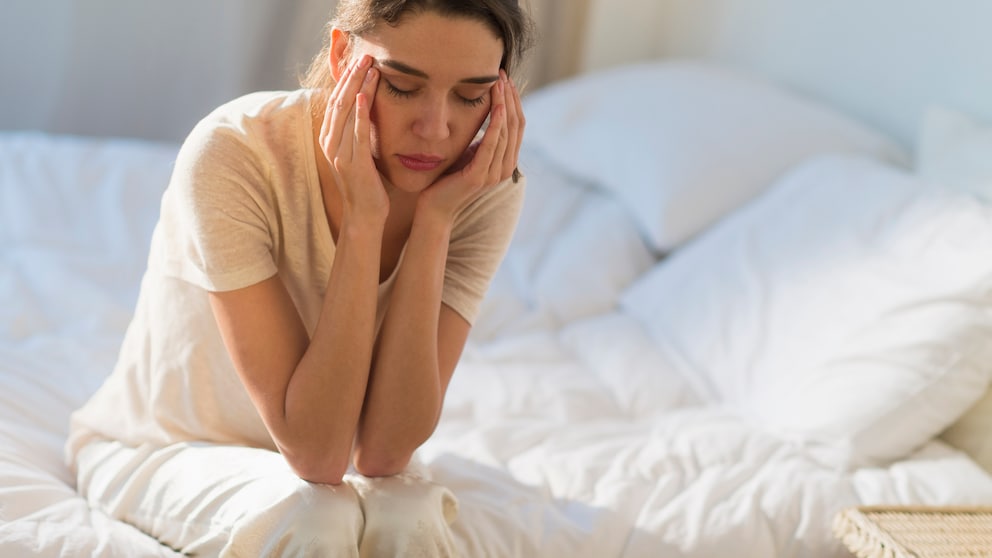October 23, 2024, 1:29 pm | Read time: 3 minutes
Unexplained headaches in the morning? Many people are familiar with this problem. But why do you wake up with a headache even though you haven’t drunk any alcohol? FITBOOK asked an expert.
Starting the day well-rested and feeling energized to tackle the tasks ahead – that’s what everyone wants. But what if the first thing you feel in the morning is a pounding in your head? At FITBOOK, sleep and general practitioner Dr. Michael Feld gives possible causes and tells us what can help relieve morning headaches and what signs may indicate a serious illness.
Overview
Incorrect lying position
Is your pillow possibly too big? If your shoulders can’t sink in properly, your neck and upper back can quickly become tense. According to Dr. Feld, morning headaches are often caused by tension. A new pillow or a firmer mattress that supports the entire weight of the body can solve the problem.
Other orthopaedic problems
Of course, you might have slept in an awkward position or been exposed to a draft, for example, from a fan or a strong, cold wind. The expert also notes that an orthopedist or physical therapist can help if you’ve strained your neck or back.
Teeth grinding
Those who grind their teeth might also recognize morning headaches, as the clenching and grinding can lead to severe tension in the jaw area. This tension moves into the temples and head. Dentists summarize such complaints as craniomandibular dysfunction (CMD), and you can see the (unconscious) habit, by the way! This habit can be identified by dark abrasion marks on the teeth. According to Feld, in such cases, it can be useful to have a bite splint fitted and also to combat the habit with meditation and relaxation measures because: Grinding is – as a rule – stress-related.
Snoring
Normal snorers typically produce sounds between 40 and 45 decibels, akin to whispering, while heavy snorers can exceed 60 decibels, comparable to a normal conversation or even the noise of a busy highway, explains the sleep doctor. This can cause vibrations so strong that you wake up with a headache. Sleep apnea sufferers, particularly the roughly four percent of snorers who experience breathing interruptions that wake them, are especially prone to this issue, Feld explains. Sleep apnoea means severe stress for the body. The sudden fright triggers the body’s natural survival instinct, leading to an adrenaline surge. The muscles are activated, and blood pressure rises. Those affected, therefore, find it difficult to calm down.
High blood pressure
Normally, a restful night’s sleep should also provide the heart with a chance to relax. According to Feld, the heart rate should drop by ten beats during sleep. However, if any form of stress occurs at night – due to noise, a fright (such as a phone call), or mental worries – the drop in blood pressure can be disrupted. The result again: a headache in the morning.
Pre-existing conditions or allergies
If they only occur infrequently, morning headaches are usually harmless, Feld told FITBOOK. They often have short-term causes such as a lack of fluids or stuffy air, i.e., a lack of oxygen in the bedroom. However, according to the expert, a wide variety of pre-existing conditions can also be the cause of morning headaches, such as hypoglycemia at night due to diabetes or an allergy, for example, to house dust.

Social Media Trend What Is Behind “Sleepmaxxing” and What Are Its Benefits?

FITBOOK Experts Dr. Anne Heinz: “I advise against tooth whitening for under-18s”

Study shows What the dentist can find out about your sleep
Morning headaches – when you should see a doctor
If you keep waking up with a headache over a longer period of time, you should consult a doctor, advised Dr. Feld.

